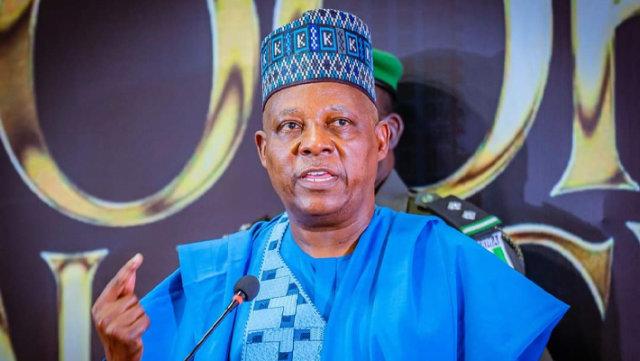ABUJA, Nigeria - The federal government On Wednesday, signed a financing agreement for the Value Chain Programme in Northern Nigeria (VCN), aimed at transforming the nation's agricultural sector.
With this agreement, the project, worth 158.15 million dollars, will commence immediately to enhance the agricultural value chain. It will also assist in adding value for farmers in nine northern states.
This initiative is jointly funded by the International Fund for Agricultural Development (IFAD), the French Development Agency (AFD), and the Nigerian government.
During the signing at the Presidential Villa in Abuja, Vice-President Kashim Shettima described the initiative as a thoughtful response to the economic realities in the northern region.
He indicated that this move fulfills President Bola Tinubu's promise to alleviate poverty in Nigeria, restore dignity to farmers, and ensure food security.
“It signifies our firm belief in the North—not as a deficit zone, but as a region rich in potential. It calls on us to fulfill our promise to combat poverty, nourish citizens, and honor farming families in Bauchi, Borno, Jigawa, Katsina, Kebbi, Sokoto, Kano, Yobe, and Zamfara.”
“What brings us together today is an investment of 158.15 million dollars, co-financed by IFAD, AFD, the Federal Government of Nigeria, and other partners. This reflects President Bola Ahmed Tinubu’s commitment to focusing on what is most important people, productivity, and prosperity.”
Shettima mentioned that the Tinubu administration has recently started laying the groundwork for the establishment of Special Agro-Industrial Processing Zones (SAPZs) across Nigeria.
He noted that the VCN programme would contribute to the SAPZs by providing a reliable supply of raw materials, ensuring that processors can access high-quality inputs.
“This collaboration will transition us from exporting raw products to exporting value-added goods, thereby creating jobs, wealth, and industrial stability,” he stated.
He pointed out that recent global trade disruptions and a rise in protectionism serve as a reminder for Nigeria to begin producing what it consumes and trading within its means.
“The agricultural tariffs and retaliatory measures from global powers like the U.S. and China have disrupted commodity supply chains. For a nation historically dependent on food imports, the message is clear: we need to cultivate what we eat and produce what we trade. The VCN addresses this need.”
“We aim to make wheat, maize, and animal feed commercially viable while investing in irrigation, processing, and storage facilities in states like Kebbi and Jigawa.
This effort not only ensures food security but also lays the foundation for agricultural exports that can compete with our oil exports. This program is significant because it focuses on the underserved: women, youth, individuals with disabilities, and returnees.”
“It acknowledges that peace and prosperity are interlinked, recognizing that in communities afflicted by conflict, agriculture serves as not just a source of income, but also a means of rehabilitation.”
He stated that the federal government will utilize digital tools to monitor all aspects, from farmer registration to market access and input distribution, as well as yield analysis.
Shettima assured that the VCN provides opportunities for enterprise, income, and dignity in regions where migration and insecurity stem from unemployment.
Earlier, former Senate President Ahmed Lawan praised IFAD, the federal government, and other collaborators for developing the program, characterizing it as a well-conceived initiative that will enhance the lives and livelihoods of many in the targeted states and beyond.
He also affirmed the National Assembly's commitment and support for implementing the various programs outlined.
Additionally, Agriculture and Food Security Minister Abubakar Kyari stated that the signing signifies a considerable milestone in transforming Nigeria's agricultural landscape.
He highlighted that the involvement of the nine states and other key stakeholders demonstrates the sub-national and federal governments' commitment to fostering inclusivity in agricultural development.
The minister expressed confidence that the VCN will yield programs and projects that will enhance agricultural productivity and improve the overall well-being of smallholder farmers, farmer organizations, and women in the region.
Katsina Governor Dikko Radda praised the leadership shown by Tinubu and Shettima in implementing the VCN program and other initiatives across northern Nigeria.
Similarly, Jigawa Governor Umar Namadi vowed to support the achievement of the various program components’ objectives and urged implementers to revisit the plan and timeline for execution to maximize benefits.
IFAD's Country Director Dede Ekoue remarked that the program is a 158.15 million dollars initiative designed to transform agribusiness in nine northern states.
She noted that the program's interventions will emphasize climate-smart agriculture, leverage innovative technologies, and improve post-harvest handling and value chain enhancement.
She added that anticipated outcomes from these interventions include the creation of over 30,000 jobs and entrepreneurial opportunities for youths, women, and vulnerable groups.
The event culminated with the signing of the agreement for the Joint Roadmap for Accelerated Start-up between the federal government and IFAD.




















